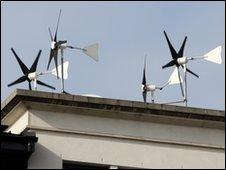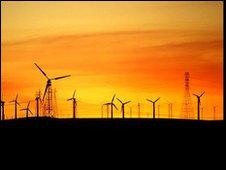Who pays for UK coalition's 'green economy'?
- Published
Building the UK's green economy could be expensive, but the government is unlikely to fund it.

Renewable energy is the key to a low-carbon future
With the failure of world leaders to reach agreement on tackling climate change last year and continuing economic difficulties, investment from the private sector has stalled.
So the coalition government has been outlining its plans to change how we go about creating a "low-carbon" economy.
A new report from accountants Ernst & Young suggests some of the government's proposals may make the UK a more attractive place for green investment.
That money will be needed because the government does not want to increase its own spending. The department responsible for tackling climate change has already announced its first cuts.
So who will pay and who will profit from the changes designed to invest more than £100bn into clean energy alone over the next decade?
Clean energy
The first thing the coalition plans to do is make "dirty" energy more expensive.
They propose a way of making electricity companies which burn fossil fuels pay a minimum price for the pollution they create.
"It's a way of increasing the price of fossil fuel power generation. It's a carbon tax, basically," says David Kennedy, who is chief executive of the Committee on Climate Change.
In the long term, it will increase the cost of electricity to consumers. But it also makes clean energy more competitive.

Low-carbon technologies could fuel the economy, the government hopes
Nuclear power could be one beneficiary from higher bills.
The Liberal Democrats, who oppose it, say they will not block new power stations.
But E.On, one of the firms hoping to build them, is unsure about the new policy.
"It's a tax," says Jonathan Smith, a spokesman for the firm. "What it doesn't do is force companies to switch to cleaner forms of generation."
Ernst & Young estimates the UK needs more than £200bn worth of initial investment by 2025 - countries are increasingly competing to convince firms to invest in their projects.
Renewables such as wind power receive direct subsidies.
The government wants to combine current credits with a new tariff paying a premium for renewable power.
"The two don't necessarily work together," says Gaynor Hartnell, head of the Renewable Energy Association.
Ministers also want to increase how much energy we get from renewables - and have asked the Committee on Climate Change to look into it.
On coal, the new government has promised to continue existing support for four new "clean-coal" power stations, which bury carbon dioxide underground.
Perhaps unsurprisingly, the parties appear to have dealt with their disagreements by supporting every option for cleaner energy.
Transport trouble
The big loser from the new government's plans could be aviation.
Extra runaways are banned at Heathrow, Gatwick and Stansted airports.
Perhaps more worryingly for the industry, the government plans to change the way it is taxed.

Easyjet is hoping that air tax reform will not be costly
They want planes to be taxed, rather than passengers, to encourage fuller flights.
"We are quite supportive of the reform, so long as it's revenue-neutral financially," says Andrew Mconnell from Easyjet.
It may well end up costing more.
On the roads, the document seems to abandon the conservative pledge to keep the price of fuel constant.
Instead, the parties have promised a network of electric charging points to encourage greener motoring, along with the gradual development of a high-speed rail network.
Home and away
Some consumers profit from the changes.
Energy for heating homes and businesses accounts for just over a quarter of emissions - and energy efficiency is the cheapest way to cut our greenhouse gases.
The coalition promises cash incentives for energy efficiency improvements in the home, which will pay off through cheaper bills.
Private firms will be encouraged to compete to offer the best packages.
They are also continuing the roll-out of feed-in tariffs - a way of selling electricity you generate from your own wind-turbine or solar panel through a smart grid.
Again, private companies, such as Eaga, are offering to fit the technology in exchange for a cut of the profits.
"We've focused on social housing and therefore those people who are least able to pay," says Eaga's John Sweeny.
But the government does not want to fund improvements directly.
It has announced the early scrapping of a scheme which offered grants to install cleaner heating systems.
Plans for a tariff to pay for fossil-fuel-free heat and another plans to promote energy efficiency in businesses - which some firms had opposed - have not been confirmed.
Paying for it
The plans may be expensive, but that doesn't mean they will be paid for by the state.
"The big question is, how is this going to survive the spending review," says Dr Doug Parr from Greenpeace.
Plans to upgrade docks to help with offshore wind or subsidies for electric car production, for example, may be vulnerable
Cuts to regional development agencies could have an impact on such projects.
The coalition plans to set up a "green investment bank" issuing green Isas to consumers to fund investment - but it is not clear how much money will be available.
Ben Warren, a partner at Ernst & Young, supports the move in principle.
"We don't know how the government intends to raise money and we don't know how the green investment bank is going to leverage in private capital," he cautions.
Most of the cost will ultimately fall on consumer bills.
Funded that way, increasing the use of renewable energy may prove unaffordable.
"All of this investment relies on consumers paying the bills and it's far from obvious they are going to be able to pay - let alone willing to," says Professor Dieter Helm from the Oxford Energy Institute.
The energy regulator, Ofgem, has previously estimated bills could rise by between 14 and 23%.
Prof Helm suggests the increased cost to business could be as much as 25%.
Ultimately, he argues, the limits to a green economy are set not by governments but "by whether or not it can be financed by the consumer".
That reality may force the coalition to face harder choices than it has so far.